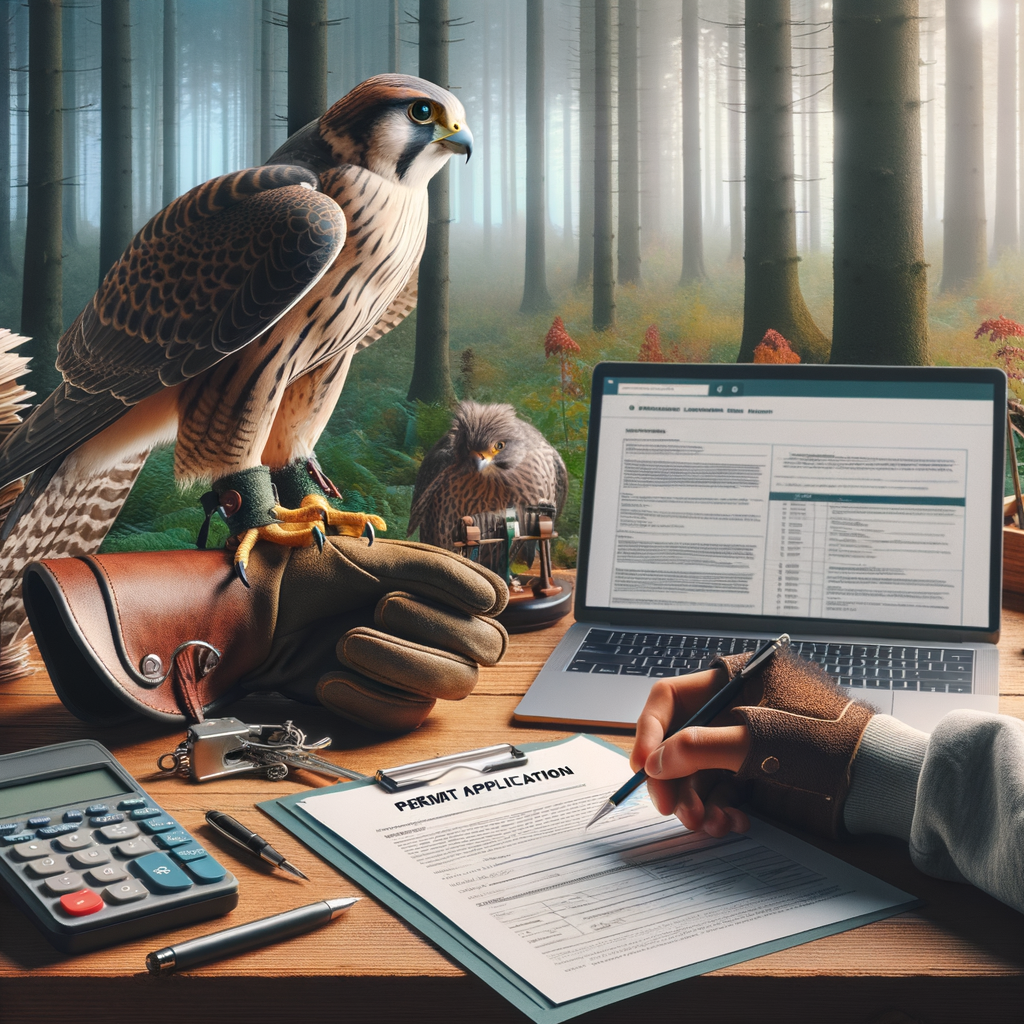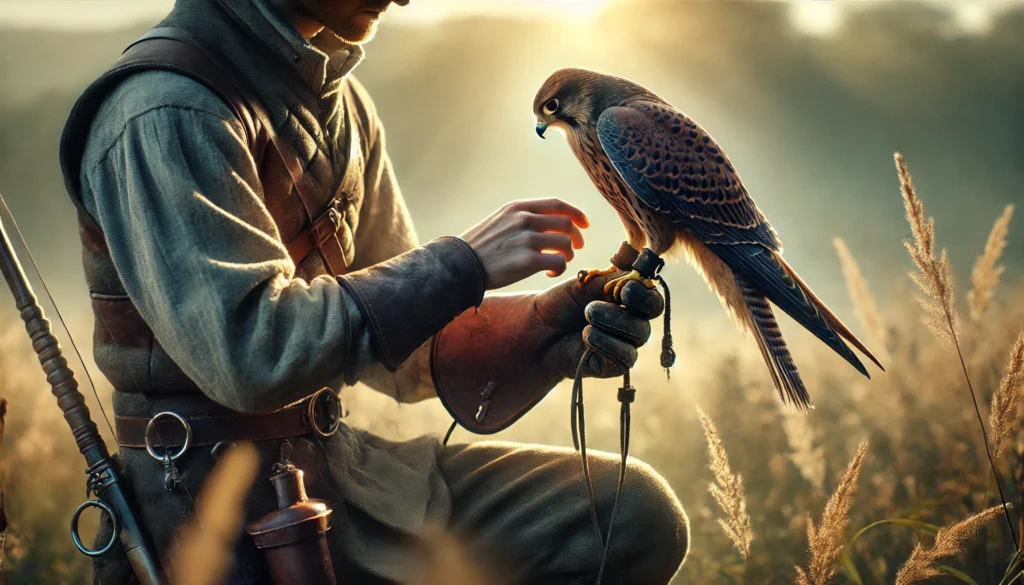Key Information for Falconry Permits and Applications
- Permits Required: You need a permit to practice falconry legally.
- Application Process: Fill out the official application form to start the process.
- Age Requirement: Applicants must be at least 12 years old.
- Examination: Passing a written examination is typically required.
- Apprenticeship: Beginners often need to complete an apprenticeship under an experienced falconer.
- Housing Standards: You must have an appropriate facility to house the birds.
- Bird Acquisition: Regulations often govern how you can acquire a bird of prey.
- Renewal and Fees: Permits need to be renewed regularly, and there might be associated fees.
- Record Keeping: Keeping detailed records of your birds and activities is usually mandatory.
- Compliance with Laws: Adhering to state and federal wildlife laws is essential.
Falconry Permits and Applications: Your Path to Becoming a Falconer
Imagine strolling through the green fields of Ireland, where every blade of grass holds a story from ancient times. Just like every skilled Irish storyteller needs a good tale, every aspiring falconer needs the right permits to create their own falconry story. At Learn Falconry, we understand that navigating the maze of permits and applications can feel like decoding a mysterious Gaelic legend. But don’t worry, we’re here to guide you through every step of the journey, making sure you have all the knowledge and tools you need to soar to new heights with your feathered friend.
In this article, we’re diving deep into the essence of falconry permits and applications’a crucial part of legally practicing this age-old art. Just like preparing to dance an Irish jig, you need the right steps and permissions to master falconry. We’ll explain why these permits are not just red tape, but essential keys to preserving the noble tradition of falconry, ensuring the well-being of the majestic birds and maintaining the delicate balance of nature.
So, gather ’round and keep reading; unlocking the secrets of falconry permits is your first step to becoming a true falconer. Ready to embark on this exciting adventure? Let’s get started!
Welcome to the exciting world of falconry! If you’re passionate about this ancient art, you’re about to embark on an incredible journey. But first, let’s talk about falconry permits, applying for a falconry license, and understanding the falconry permit process. This guide will help you navigate through these important steps.
What Are Falconry Permits?
Falconry permits are essential documents that allow you to legally practice falconry. They ensure that you meet all the requirements to care for and train a falcon. Falconry is more than just a hobby; it’s a regulated activity that involves the care of birds of prey, which means there are legalities to adhere to. To learn more about the legal aspects of falconry, check out Legal Aspects of Falconry.
Steps for Applying for a Falconry License
Applying for a falconry license involves several important steps:
- Find a Mentor:
You’ll need to find an experienced falconer willing to mentor you. A mentor will guide you through the basics and more advanced aspects of falconry. Joining a falconry club can be a great way to connect with potential mentors. For more information, visit Falconry Clubs. - Pass an Exam:
In many regions, you must pass a written exam that tests your knowledge about raptors, regulations, and falconry practices. The exam ensures that you understand the responsibility you’re about to take on. - Get Your Facilities and Equipment Approved:
Your facilities and equipment will also need to meet certain standards. The authorities will inspect your mews (the bird’s housing), perches, and other equipment to ensure they’re safe and suitable. Discover more about the necessary equipment on our Falconry Equipment page. - Submit Your Application:
After passing your exam and getting your facilities approved, you’ll submit your application for review. This can include fees and additional requirements depending on your region. Check out State and Federal Falconry Laws for specific guidelines.
The Falconry Permit Process
The falconry permit process is designed to ensure that only those who are well-prepared and dedicated can become falconers. Here’s what you can expect:
Training and Testing
Your journey starts with gaining knowledge and skills. This involves studying falconry and spending time with your mentor to learn practical skills. You’ll need to understand falcon health, which you can dive deeper into at Falcon Health and Nutrition.
Facility Inspection
Once you’re knowledgeable, your facilities must be inspected. This ensures that you have a safe environment for your bird. Proper facilities include suitable housing, perches, and essential equipment for maintaining your falcon’s health and wellbeing. Our section on Falconry Techniques can give you more insights into traditional and modern methods.
Application Submission
After passing your tests and getting your facilities approved, you’ll submit your application. Make sure to provide all the necessary documentation and fees. The application process may take some time, so patience is key.
Further Exploration
Falconry is a lifelong learning journey. While the permit is just the beginning, there are many other aspects to explore. For instance, check out our resources on Training a Falcon and different Species of Falcons to continue your education and passion for falconry.
With dedication and the right guidance, you’ll successfully navigate the falconry permit process and be on your way to becoming a skilled falconer. Happy hawking!
Guide to Applying for Falconry Permits in 2024
Are you excited about getting into falconry? Understanding the permit application process is your first step! Falconry is a fantastic blend of art and science that requires dedication and respect for raptors. Let’s dive into the specifics of obtaining your falconry license and permits.
Falconry License Requirements
Before you can practice falconry, you need to get the right license. There are three levels of licenses:
| License Level | Minimum Age | Experience Required | Raptors Allowed |
|---|---|---|---|
| Apprentice | 14 years | None | 1 raptor |
| General | 18 years | 2 years as an Apprentice | Up to 3 raptors |
| Master | 18 years | 5 years as a General | Up to 13 raptors |
Falconry Hunting Seasons
Your falconry license also allows you to participate in specific hunting seasons. Here are the hunting seasons for 2024:
| Hunting Type | Dates |
|---|---|
| Small Game Hunting Season | Nov 1, 2023 – Feb 29, 2024 |
| Regular Waterfowl Hunting Season | Nov 18 – Nov 26, 2023 & Dec 9, 2023 – Jan 28, 2024 |
| Falconry Extended Waterfowl Hunting Season | Nov 1, 2023 – Feb 13, 2024 |
Suffolk County Parks Falconry Permit
To practice falconry in Suffolk County Parks, you need to secure a special permit. Here’s what it entails:
| Requirement | Details |
|---|---|
| Cost | $38 |
| Validity Period | Nov 1, 2023 – Feb 29, 2024 |
| Additional Requirements | – Valid Suffolk County Green Key Card – Valid NY State Falconry License – Valid NY State Small Game License – Valid Federal Migratory Bird Hunting and Conservation Stamp (for waterfowl hunting) |
Virginia Peregrine Falcon Take
For those interested in capturing Peregrine Falcons in Virginia, note the following conditions:
| Season | Dates |
|---|---|
| Eligible Applicants | Master or General Class falconers |
| Take Limits | – Total: 4 passage Peregrine Falcons – Non-resident Limit: 1 of the 4 birds |
Application Process by State
California
| Application Fee | $19.57 |
|---|---|
| License Fee | $107.89 (General or Master) |
| Renewal Period | July 1 – June 30 of the following year |
| Inspection | Required for new applicants, those renewing lapsed licenses, or moving facilities |
Oregon
| Examination | Pass with a score of 80% or higher |
|---|---|
| Sponsor | Find a General or Master falconer |
| Facility and Equipment | Build and maintain suitable facilities and equipment |
New York
| Examination | Pass with a score of 80% or higher |
|---|---|
| Sponsor | Find a General or Master falconer |
| License Expiry | Every 5th year on December 31 |
Annual Reporting and Additional Requirements
| Hunting License | Must hold a valid hunting license in addition to the falconry license |
|---|---|
| Facility and Equipment Maintenance | Maintain suitable facilities and equipment throughout the license period |
| Annual Reporting | Submit annual reports detailing activities and raptor care |
Remember, embarking on a falconry journey is a wonderful commitment that fosters a unique bond between you and your bird of prey. Happy hunting!
Wrapping Up Your Falconry Permit Application Journey
Obtaining a falconry permit in 2024 is a fulfilling but detailed process. You can start your journey as early as age 12 and advance through the different levels of licensing’Apprentice, General, and Master. Ensure you meet the age and experience requirements suited to each level. Passing a written exam, finding a sponsor, and maintaining proper facilities for your raptors are essential steps in this process.
Each state has unique requirements. For example, California and New York have specific costs and inspections for applying, while Oregon emphasizes a high score on its written exam and sponsorship. Additionally, you may need various hunting licenses and permits to comply with local regulations.
Falconry requires a significant time and financial commitment. Your dedication will include daily raptor care, proper equipment maintenance, and annual reporting of your activities. However, the joy of mastering this ancient art and bonding with these magnificent birds makes it all worth it.
By following these guidelines, you’re on the right path to becoming a successful falconer. Prepare your documents, gather your resources, and take the leap into this extraordinary world of falconry. Happy hunting!



